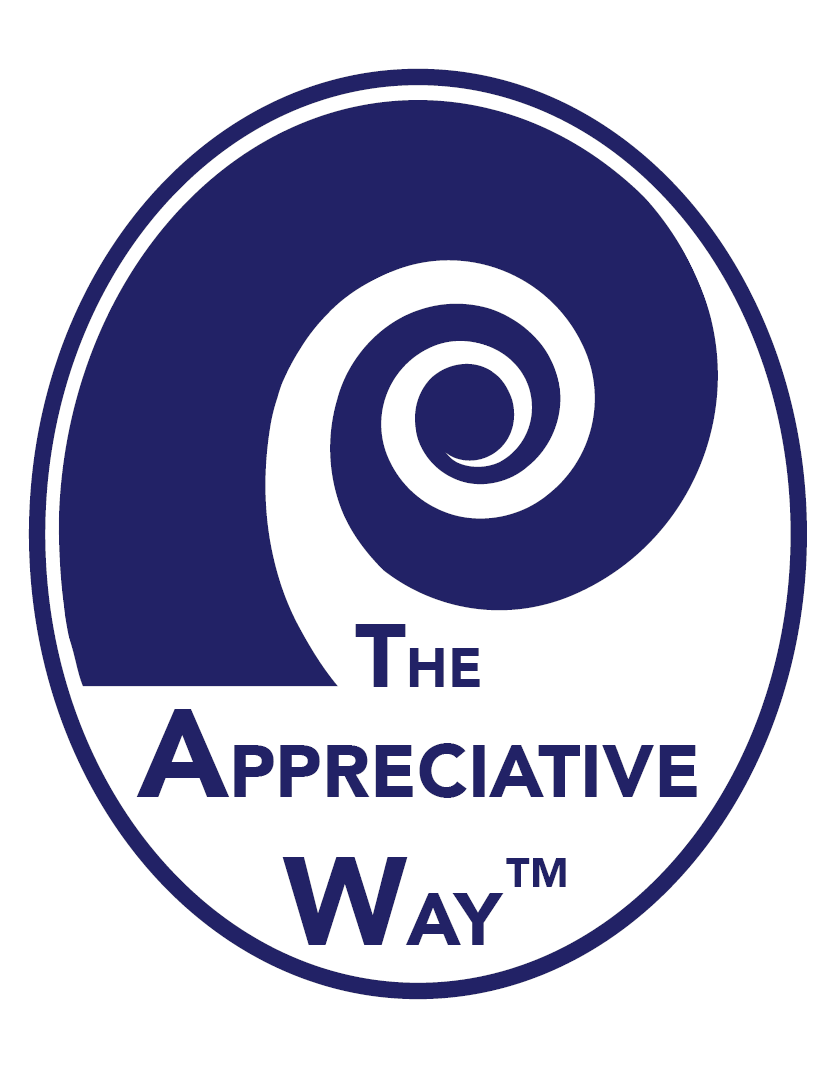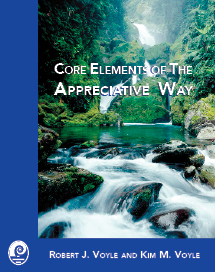

Rob Voyle's Appreciative Way Blog
Additional Articles By Year: 2016 | 2015 | 2014 | 2013 | 2012 | 2011 | 2010
Teaching Forgiveness and Staying in Love
Posted: February 8, 2016 by Rob Voyle
My friend and colleague Chris Rankin-Williams said in his sermon on the Sunday
after 9-11, The challenge of this life is not to stay alive the challenge of
this life is to stay in love.
That idea brought into focus what my ministry was about and what it has
continued to be about.
Personally I don't like being afraid and I don't like being angry. They are very
draining emotions and they do not lead to positive outcomes for me or others.
And I have never known anyone to change, for the better, because I hated them.
It seems that at every moment of every day I am confronted with opportunities to
love or to hate. I have given up watching most of the so-called news programs
because I feel often I am being told what to fear and exhorted to hate.
And then there is this Jesus guy who says: "love your enemies." That is about
the most un-American thing I have ever heard and if I was to listen to many
Americans the most unchristian thing anyone could say. Hating has become part of
our culture and our churches. Revenge has become a virtue, something our culture
esteems.
One of the ways Christians justify the existence of hate in their lives is to
say "love the sinner and hate the sin." Spiritually speaking that makes no sense
at all. Once you are in a state of hate toward one thing it will leak out and
contaminate the rest of our existence. The Jesus I follow wasn't a flip-flopper
between states of love and hate.
I listen to Jesus telling me to love my enemies, and I hear Chris' words "the
challenge is to stay in love."
Teaching people how to forgive is my act of sedition, to overthrow the culture
of hate. Forgiveness however is not simply the end goal. Beyond setting people
from the burden of self-inflicted resentment the purpose of forgiveness is to
open the way to return to living in love.
How Do We Want To Wait Until Others Change?
Think of someone who really annoys you and who is not likely to change their
offensive behavior. How does hating them help you, or them for that matter
beyond fueling their offensive behavior?
The only thing we can do is decide on how we want to wait for them to change.
This is where we meet the challenge to stay in love.
We can wait in hate.
Or we can forgive and wait with a twinkle in our eye and love in our hearts.
This is the kind of waiting that I see in Archbishop Tutu and the Dalai Lama.
They have faced and continue to face major oppression yet they have the ability
to fiercely confront it while maintaining their joy.
Perhaps for most of us there is an intermediate state where we have forgiven and
wait with emotional neutrality without the transcendent twinkle. Here we are no
longer attached to specific outcomes of good or bad for the other and can turn
our attention to other life-giving relationships.
And another, perhaps more enlightened place is a compassionate state where we
can wish good for the other, without being attached to what that good might be.
(From my experience when dealing with difficult relationships my idea of what is
good for the other is always about what would really be good for me.)
Waiting with compassion is one way to meet the challenge of staying in love. As
my beloved Kim says, "compassion, its not just for saints anymore."
Rob Voyle
Director, Clergy Leadership Institute
P.S. Please let me know if you are interested in sharing in my act of cultural
sedition and hosting a Forgiveness Training program in your church.
Additional Articles By Year: 2016 | 2015 | 2014 | 2013 | 2012 | 2011 | 2010
Previous Posts By Category
Coaching
- I Saw Satan Fall From Heaven
- Church Growth Makes Absolutely no Sense
- Agents of Change or Agents of God, and What's Christmas Got to Do With It?
- Are You Using the Right Map?
- Coaching: Paul's Conundrum Explained
- Goals Must Be Imaginable
- Coaching Next Steps to Achieving Goals
- Shaman 101: Change the Question
- Changing the Paradigm of Blame
- The Sermon I Need to Hear this Christmas
- Blue Christmas Meditation
- What's the Purpose, What's My Purpose?
- Church Growth and Making Disciples
- Thinking about Language: Are People Assets or Treasures?
- Transfiguration and Agents of Transformation
- Managing Resistance to Change
- Ensuring Change is a Blessing
- Growing Leaders Through Intentional Coaching
- Forget Balance, Get Integrated!
- Get Feed-Forward not Feed-Back
- The Power of Great Questions
Forgiveness
- No Reconciliation Without Repentance
- Moving Mountains of Resentment and Uprooting Mulberry Trees of Misery
- Teach Your Congregation to Forgive: Five Week Lenten program
- Forgiveness and Standing Silent Before the Pilates of this World
- Transforming Anger Into Practical Compassion
- Teaching Forgiveness and Staying in Love
- Stick with Love if You Want Others to Change
- I Tried, But I Just Can't Forgive: Part II
- I Tried, But I Just Can't Forgive: Part I
- The Power to Resolve the Past Is Within You?
- Teach Them How to Forgive this Sunday
- Transforming Victim Narratives: Mark 7:24-30
- 9/11: Resentment, Forgiveness, and Reconciliation
Leadership
- Parishioners and Staff are Treasures not Assets
- Anglican Primates: My Appreciative Way Perspective on the Conflict
- Leadership is About Empowering not Controlling
- Who is the Greatest: Calling Forth the Best
- Discovering the Power of an Ennobling Dream
- Incarnational Leadership
- Core Leadership Competencies: Three Ways of Being a Leader.
- Core Leadership Competencies: The Art of Wise Pruning.
- Core Competencies for Being Your Congregation's Chief: Asking Powerful Questions.
- Core Leadership Competencies: Empowering Others
- Core Competencies for Being Your Congregation's Chief
- Creating Sustainable Change through Incarnational Leadership
- The Challenge of Growing the Church
- All Sustainable Change is an Inside Job
- The Importance of Understanding Your Purpose
- Thinking and Acting Like a Leader
Performance Review
Sermon
- Those Damn Foreigners!
- No, You Don't Want to Take Your Ministry to the Next Level
- Why Be Good
- Teach Us to Pray
- We Are God's Chosen People Not God's Protected People
- Easter and Three Stories When Bad Stuff Happens
- An Appreciative Lent
- Remembering Dr. King
- Find Resurrection this Easter not Reincarnation
- Lent, Coaching, Change and Transformation
- Doing the Unexpected this Christmas
- Appreciatively Thinking about Lent and the Ten commandments
- Thinking about Lent, Sin, and Grace
- Lent and an Appreciative Approach to Repentance
Teaching Love
Tigers
Previous Posts By Date
2016
- The Amur Tigers Need You!
- No Reconciliation Without Repentance
- Confessions and Repentance for Election Failure!
- Those Damn Foreigners!
- Moving Mountains of Resentment and Uprooting Mulberry Trees of Misery
- Teach Your Congregation to Forgive: Five Week Lenten program
- No, You Don't Want to Take Your Ministry to the Next Level
- Parishioners and Staff are Treasures not Assets
- Why Be Good
- Teach Us to Pray
- Good Samaritans and What Is Love Calling Us To Do
- I Saw Satan Fall From Heaven
- We Are God's Chosen People Not God's Protected People
- Forgiveness and Standing Silent Before the Pilates of this World
- Transforming Anger Into Practical Compassion
- Teaching Forgiveness and Staying in Love
- Church Growth Makes Absolutely no Sense
- Anglican Primates: My Appreciative Way Perspective on the Conflict
- Stick with Love if You Want Others to Change
2015
- Agents of Change or Agents of God, and What's Christmas Got to Do With It?
- Teaching People How to Say Yes to Sex
- Leadership is About Empowering not Controlling
- Who is the Greatest: Calling Forth the Best
- What in God's name is Going On Here?
- I Tried, But I Just Can't Forgive: Part II
- I Tried, But I Just Can't Forgive: Part I
- The Power to Resolve the Past Is Within You?
- Are You Using the Right Map?
2014
- Christmas: God the slow learner, but thank Jesus, God learns!
- People in the Church Love Change!
- Teach Them How to Forgive this Sunday
- Coaching: Paul's Conundrum Explained
- Goals Must Be Imaginable
- Coaching Next Steps to Achieving Goals
- Mutual Ministry Valuation
- I Hate Performance Reviews: Creating Cultures of Excellence
- Why did Christianity Flourish: The Power of Your Easter Story
- Easter and Three Stories When Bad Stuff Happens
- Shaman 101: Change the Question
- The Search Process: It is not Dating
- Discovering the Power of an Ennobling Dream
2013
- Incarnational Leadership
- Changing the Paradigm of Blame
- Core Leadership Competencies: Three Ways of Being a Leader.
- Core Leadership Competencies: The Art of Wise Pruning.
- Core Competencies for Being Your Congregation's Chief: Asking Powerful Questions.
- Core Leadership Competencies: Empowering Others
- Core Competencies for Being Your Congregation's Chief
- An Appreciative Lent
2012
- The Sermon I Need to Hear this Christmas
- Blue Christmas Meditation
- Remembering Dr. King
- What's the Purpose, What's My Purpose?
- The Language of Growing in Love
- Church Growth and Making Disciples
- Transforming Victim Narratives: Mark 7:24-30
- Creating Sustainable Change through Incarnational Leadership
- Find Resurrection this Easter not Reincarnation
- Lent, Coaching, Change and Transformation
- Thinking about Language: Are People Assets or Treasures?
- From Transfiguration to Tempting Job Offers
- Transfiguration and Agents of Transformation
- Managing Resistance to Change
2011
2010
- The Importance of Understanding Your Purpose
- Thinking about Lent, Sin, and Grace
- Ensuring Change is a Blessing
- Thinking and Acting Like a Leader
- Growing Leaders Through Intentional Coaching
- Forget Balance, Get Integrated!
- Get Feed-Forward not Feed-Back
- Lent and an Appreciative Approach to Repentance
- The Power of Great Questions
The Appreciative Way

Discover the essentials of the
Appreciative Way in this fast
read format book by
Rob and Kim Voyle.
About the Author
Rob Voyle
The Rev. Dr. Rob Voyle is a leader in the development and use of appreciative inquiry in church and coaching settings.
Rob's Approach to Training
- Helpful: Training must provide practical, sustainable solutions for today's challenges.
- Humorous: Creativity and humor go together as people enjoy new insights.
- Healing: I create opportunities for people to experience transformational insights that lead to new ways of living, working, and being in the world.
>>
See more on Rob's
Helpful, Humorous, Healing
approach to training.
